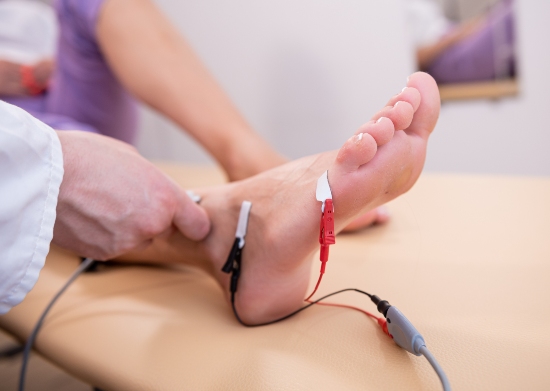Peripheral Neuropathy Therapy in Houston, TX
We Specialize in Peripheral Neuropathy Relief
Experience relief from peripheral neuropathy with the specialized care offered at Neurology Consultants of Houston. Our team of renowned neurologists in Houston, TX, is dedicated to providing comprehensive and cutting-edge treatments for peripheral neuropathy, a condition affecting the peripheral nervous system. Take the first step towards a pain-free life today – schedule a consultation with our expert neurologists.

What Is Peripheral Neuropathy?
Peripheral neuropathy refers to a condition that involves damage or dysfunction of the peripheral nerves, which are responsible for transmitting signals between the central nervous system and the rest of the body. This disorder often leads to various symptoms, including pain, numbness, tingling, muscle weakness, and coordination difficulties, typically affecting the extremities such as the hands and feet. Various factors can contribute to the development of peripheral neuropathy, including diabetes, infections, autoimmune disorders, traumatic injuries, and certain medications or toxins.
Symptoms of Peripheral Neuropathy
Peripheral neuropathy can manifest through various distressing symptoms, often impacting the quality of life for those affected. Common peripheral neuropathy symptoms include:
- Numbness – Patients often experience a loss of sensation, particularly in the hands, feet, arms, or legs, making it difficult to detect temperature changes, pain, or touch sensations.
- Tingling or Pins and Needles Sensations – Many individuals with peripheral neuropathy report a persistent sensation of tingling or pricking, often described as “pins and needles,” which can be constant or sporadic.
- Burning Pain – Peripheral neuropathy frequently manifests as a chronic, burning pain ranging from mild discomfort to intense, debilitating sensations, particularly in the affected limbs.
- Muscle Weakness – Patients may notice a progressive muscle weakness, especially in the extremities, leading to difficulties performing routine tasks such as walking, grasping objects, or maintaining balance.
- Coordination Challenges – Some individuals with peripheral neuropathy may experience coordination problems, leading to difficulties with fine motor skills, dexterity, and overall movement control, which can significantly impact their daily activities and quality of life.
Causes of Peripheral Neuropathy
Several factors can significantly elevate the risk of developing peripheral neuropathy, potentially leading to complications and debilitating symptoms. These risk factors include:
- Diabetes – Uncontrolled or poorly managed diabetes can result in high blood sugar levels, which may gradually damage the nerves, especially in the extremities, causing diabetic neuropathy.
- Chronic Alcoholism – Excessive alcohol consumption over an extended period can lead to nutritional deficiencies, nerve damage, and toxic effects, increasing the likelihood of alcoholic neuropathy.
- Autoimmune Diseases – Conditions like rheumatoid arthritis, lupus, and Guillain-Barre syndrome can trigger an immune system response that attacks the nerves, leading to autoimmune neuropathies.
- Infections – Certain viral or bacterial infections, such as HIV, Lyme disease, or shingles, can directly affect the nerves, leading to inflammation and subsequent nerve damage.
- Trauma or Injury – Physical injuries, accidents, or trauma, including bone fractures or sports-related injuries, can directly damage peripheral nerves, potentially leading to traumatic neuropathies.

How Peripheral Neuropathy Affects Your Life
Peripheral neuropathy can profoundly impact various aspects of daily life, significantly affecting both physical and emotional well-being. The symptoms, including numbness, tingling, and burning pain, can lead to difficulty performing simple tasks like buttoning a shirt or walking without assistance. Coping with the challenges posed by peripheral neuropathy often requires substantial adjustments to one’s lifestyle, daily routines, and social activities, emphasizing the importance of comprehensive management and support from healthcare professionals and caregivers.
How Do We Treat Peripheral Neuropathy?
Treatment for peripheral neuropathy typically involves a comprehensive approach focused on managing symptoms, addressing underlying causes, and improving overall quality of life. Medical interventions often include prescription medications such as pain relievers, anti-seizure drugs, or antidepressants to alleviate nerve pain and discomfort. Additionally, physical therapy, occupational therapy, and nerve stimulation techniques may be recommended to enhance muscle strength, improve coordination, and alleviate symptoms. Lifestyle modifications, including adopting a healthy diet, regular exercise, and careful foot care, are often crucial in managing conditions like diabetes that contribute to neuropathy.
Why Choose Neurology Consultants of Houston
Empower yourself to reclaim control over your life with the exceptional peripheral neuropathy services at Neurology Consultants of Houston. Our commitment to delivering personalized, innovative, and compassionate care sets us apart as leaders in the field. Contact us today to schedule an appointment and take the first step toward a more comfortable and fulfilling life.
